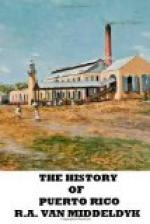The colonists were likewise exonerated from the payment of tithes for fifteen years, and at the end of that period they were to pay only 2 12 per cent. They were equally free, for the same period, from the payment of alcabala,[49] and at the expiration of the specified term they were to pay 2 12 per cent, but if they shipped their produce to Spain, nothing. The introduction of negroes into the island was to be perpetually free. Direct commerce with Spain and the other Spanish possessions was to be free for fifteen years, and after that period Puerto Rico was to be placed on the same footing with the other Spanish colonies. These concessions and exemptions were contained in thirty-three articles, and though, at the present day, they may seem but the abolition of unwarrantable abuses, at the time the concessions were made they were real and important and produced salutary effects. They brought foreigners possessing capital and agricultural knowledge into the country, whose habits of industry and skill in cultivation soon began to be imitated and acquired by the natives.
The effects of the revolution of 1820 were felt in Puerto Rico as well as in Spain. The concentration of civil and military power in the hands of the captains-general ceased, but party spirit began to show its disturbing influence. The press, hitherto muffled by political and ecclesiastical censors, often went to the extremes of abuse and personalities. Mechanics and artisans began to neglect their workshops to listen to the harangues of politicians on the nature of governments and laws. Agriculture and commerce diminished. Great but ineffectual efforts were made to induce the people of Puerto Rico to follow the example of the colonies on the continent and proclaim their independence.
This state of affairs lasted till 1823, when, through French intervention, the constitutional Government in Spain was overthrown, and a second reactionary period set in even worse in its manifestations of odium to progress and liberty than the one of 1814. The leading men of the fallen government, to escape death or imprisonment, emigrated. Among them was O’Daly, who, after living some time in London, settled in Saint Thomas, where he earned a precarious living as teacher of languages.[50]




